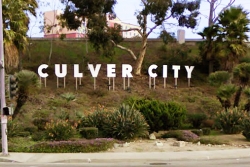Local opponents of hydraulic fracturing are considering another approach to keeping the controversial practice out of Culver City.
Former Culver City Councilman Gary Silbiger talked about a proposal for a local ballot initiative that would allow Culver City or other municipalities the right to prevent hydraulic fracturing within their boundaries at a March 23 seminar at West Los Angeles College.
Hydraulic fracturing, commonly known as “fracking,” is an oil extraction technique that used to obtain oil and natural gas in areas where those energy supplies are trapped in rock and sand formation by injecting a mixture of water and chemicals into the ground.
Prior to the seminar, Silbiger, who could not be reached for comment for this story, spelled out the reasons why he thought a ballot measure would be appropriate at the seminar.
“In a participatory democracy, placing items on a ballot for a vote serves two fundamental goals – the ability to educate, engage, and organize our community; and to vote for a proposal that will resolve major issues that the elected officials either refuse to, or cannot, accomplish,” he explained.
“Passing a strong anti-fracking ballot initiative will protect our neighborhoods from severe health and safety concerns while at the same time demonstrate to other communities that a unified voice has power beyond our dreams.”
Last year, Culver City became one of the first municipalities in California to send a resolution to Sacramento lawmakers requesting that they ban the practice. There is also currently a ban on oil drilling in Culver City.
In California, any voter can put a referendum or initiative on the ballot.
Proponents of the oil extraction procedure believe it will lead to a safer method of oil drilling and eventually lessen the nation’s dependency on imported oil.
Those who are in opposition argue that not only is it unregulated in California but it is also unsafe and unhealthy from an environmental standpoint.
Culver City resident J.E. Brockman, who attended the seminar, applauded the former councilman’s proposal.
“Gary Silbiger’s ballot initiative proposal to halt fracking is an excellent idea,” said Brockman. It will bring the issue out into the open.”
Fracking has been a frequent topic of discussion in Culver City for nearly two years and is part of a continued nationwide discussion on the topic.
The California Department of Conservation released its proposed fracking regulation guidelines on Dec. 18. They cover required data that drilling operators would have to submit prior to beginning hydraulic fracturing, which would be sent to the corresponding regional water quality boards or agencies with jurisdiction within 10 days of beginning hydraulic fracturing operations.
In California, a bill by former Assemblywoman Betsy Butler (D- Marina del Rey) that would have made it illegal to approve the drilling of a well in which hydraulic fracturing is used or is proposed to be used failed to get out of a state Senate appropriations committee last year.
Texas-based Plains, Exploration and Production, an oil and gas company that operates the Inglewood Oilfield, is a short distance from homes in Culver Crest and the potential for fracking accidents has heightened already frayed nerves for several of the hillside residents, many who do not trust the oil firm dating back several years.
PXP released its hydraulic fracturing report on Oct. 10.
Attorney Michael Colantuono of Colantuono & Levin said local measures are typically allowed unless the state Legislature expressly states otherwise or when a legislature has so thoroughly addressed a proposed initiative that a court finds legislative intent.
How an initiative is crafted would be essential in determining if it is viable. “Is it a land use measure or will it address how oil wells are drilled?” asked Colantuono, who has worked with Culver City on municipal finance matters. “Many municipalities have the power over their own land use decisions.”
Culver City Assistant City Manager Martin Cole also noted that the initiative process can be complicated.
“I always recommend that any group considering sponsoring an initiative seek a qualified consultant or attorney to provide detailed guidance and legal advice prior to creating a petition and moving forward with signature gathering,” said Cole, who is also Culver City’s city clerk.
Colantuono, who was named as one of the “Top 25 Municipal Lawyers in California” by the Daily Journal, a legal newspaper, said when political activists and politicians craft ballot measures, important legal nuances can be missed. “When attorneys write them it’s a different story,” he said.
Oil and gas extraction activities are generally exempt from the disclosure requirements of the Emergency Planning and Community Right to Know Act, according to , an environmental attorney.
Under the federal Safe Drinking Water Act’s Underwater Injection Control Program, hydraulic fracturing activities are currently exempt from all regulation unless diesel fuel is used. It is typically regulated at the state level.
Brockman says there are a lot of residents who still do not know what hydraulic fracturing is despite the oil extraction procedure being a focus of local coverage in recent months as well as the spotlight that national newspapers have shined on it.
“There are so many who still don’t know that fracking is being done here, or when they learn about it, can’t believe our government would allow it in such a densely populated area,” he said.
The city attorney’s office did not respond to inquires regarding a fracking ballot measure.

